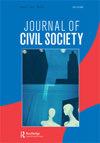Building language, building province: Civil society and ethnic nationalism in Pakistan
IF 0.9
Q3 POLITICAL SCIENCE
引用次数: 1
Abstract
ABSTRACT The Siraiki ethnic movement in Pakistan has gained prominence since the 2000s through its demand for the creation of a new province in the southern districts of Punjab. This article examines the crucial role played by civil society in the growth of Siraiki nationalism. Starting from the 1960s, the Siraiki intelligentsia engaged in identity construction through an emphasis on recognition of Siraiki as a language separate from Punjabi. Having achieved this goal in 1981, the Siraiki movement quickly moved towards territorial ambitions with the adoption of the demand for creation of a Siraiki province in south Punjab. This claim gained momentum after the 18th Amendment to the Pakistan constitution in 2010 that gave rise to the demand for new provinces from ethnic minorities. The question of a south Punjab province became part of mainstream politics when it was adopted by the Pakistan People’s Party and the Pakistan Tehreek-e-Insaf in the 2013 and 2018 elections, respectively. Throughout the evolution of the Siraiki movement towards the agenda of a new province, civil society acted as the prime agency for ethnic mobilization.建构语言,建构省份:巴基斯坦的公民社会与族群民族主义
摘要自2000年代以来,巴基斯坦的西拉基族运动因其要求在旁遮普省南部地区建立一个新的省份而声名鹊起。本文考察了民间社会在西来木民族主义发展中所起的关键作用。从20世纪60年代开始,西拉基知识界通过强调承认西拉基语是一种独立于旁遮普语的语言来进行身份建构。在1981年实现这一目标后,西拉基运动迅速实现了领土野心,通过了在旁遮普南部建立西拉基省的要求。在2010年巴基斯坦宪法第18修正案引发少数民族对新省份的需求后,这一主张得到了推动。当巴基斯坦人民党和巴基斯坦民族党分别在2013年和2018年的选举中通过旁遮普省南部的问题时,该问题成为主流政治的一部分。在西来基运动走向新省议程的整个过程中,民间社会充当了民族动员的主要机构。
本文章由计算机程序翻译,如有差异,请以英文原文为准。
求助全文
约1分钟内获得全文
求助全文

 求助内容:
求助内容: 应助结果提醒方式:
应助结果提醒方式:


